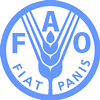 |
|||||||||
|
|||||||||||||||||||
|
|
Urgent Measures Required to Reduce Impact of High Food Prices on the Poor 09/04/08 Urgent measures are needed to ensure that short-term adverse effects of higher food prices do not impact even more alarmingly on the very poor, FAO Director-General Jacques Diouf said today.
Addressing the first Global Agro-Industries Forum in New Delhi, along with the heads of UNIDO and IFAD, Dr Diouf highlighted the important role that agro-industry had to play in overcoming these problems. “World food prices have risen 45 percent in the last nine months and there are serious shortages of rice, wheat and maize,” Dr Diouf said. A combination of factors, including reduced production due to climate change, historically low levels of stocks, higher consumption of meat and dairy products in emerging economies, increased demand for biofuels production and the higher cost of energy and transport have led to surges in food prices. UNIDO’s Director-General, Kandeh K. Yumkella, said: “Climate change will impose great stresses on the world’s ability to feed ever growing populations. This challenge brings new threats to arable land areas, livestock rearing and fisheries through droughts, water shortages and pollution of land, air and sea. It is, after all, agricultural and livestock production that provide the raw materials that are basic to human existence – especially food.” The President of IFAD, Lennart Båge, told the conference that in recent years, a number of developing countries have become net importers of food. In countries from Bangladesh to Zambia, nearly 40 per cent of the population was undernourished. “The explosive and rapid rise of food prices is worsening their situation,” Båge said. “With greater investment in agriculture and rural development, the world’s 400 million smallholders could mobilize their under-utilized potential, not only to improve their own nutrition and incomes but to enhance national food security and overall economic growth,” the IFAD President said. Potential of agro-industry Dr Diouf said: “It is essential to increase agricultural investment in water control and infrastructure and to facilitate small farmer access to inputs, so they can raise their productivity.” He stressed the importance of effective marketing and processing systems for agricultural products. “Agro-industry helps preserve foodstuffs, add value and reduce post-harvest losses; it enables products to travel longer distances, including to the rapidly expanding cities,” he noted. “For its part, agro-industry generates demand for agricultural products and holds vast potential for off-farm rural employment. It also adds significant value to farm production, whether for domestic or export markets.” The Global Agro-Industries Forum, being held from April 8-11, has attracted over 500 participants from 120 countries. Both government and private sectors are represented and there are also participants from NGOs and farmer organizations. Benefit sharing The Agency Heads warned that the benefits of agro-industrial development might not be universally shared, as small agricultural enterprises are facing difficulties in some countries. Customs tariffs, non-tariff barriers, standards and certification requirements, and export volumes demanded constitute major impediments for many small exporters. Urbanization, rising incomes and women joining the labour market in many countries have boosted demand for convenience food. Worldwide, processed food and beverages now account for 80 percent of total food and drink sales, which rose 57 percent between 2001 and 2007. Partly in response to this trend, there has been a rapid expansion of supermarkets in many countries, notably in Latin America and Southeast Asia. FAO, in partnership with the other agencies and NGOs, is working to establish solid links between small farmers and buyers, by grouping and organizing farmers into producer associations and cooperatives. Dr Yumkella said that for the UN system and its development partners the challenge was to cooperate: to help agro-industrial enterprises to grow and flourish; to provide jobs and create wealth; and, thus to foster sustainable economic and human development. The New Delhi Forum is jointly organized by FAO, the United Nations Industrial Development Organization (UNIDO) and the International Fund for Agricultural Development (IFAD), in close collaboration with the Government of India. FAO is also organizing a High-Level Conference on “World Food Security: the Challenges of Climate Change and Bioenergy” at its headquarters in Rome from 3 to 5 June 2008, thus offering a forum for Heads of State and Government to discuss the pressing challenges facing global food security and to adopt required actions to deal with the situation.
|
||||||||||||||||||

|
|
||||||||||||||||||
| home | agri-services | pedigree
pen | news | dairy | beef | machinery property | organisations | site map |
|||||||||||||||||||


